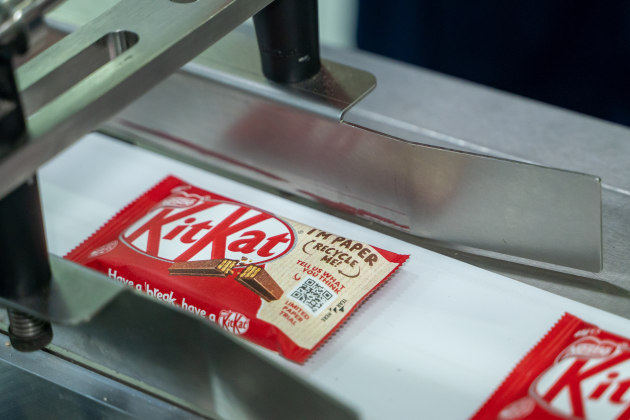In a global first for the KitKat brand, Australia's number one chocolate bar will trial a paper packaging wrapper on the KitKat four-finger 45g variant. A QR code on pack will allow consumers to have their say about the new pack.
The KitKat paper wrapper trial will run for a limited period as an exclusive agreement with Coles Supermarkets across Western Australia, South Australia and the Northern Territory. More than a quarter of a million KitKat bars will be wrapped in the new paper packaging – enough to stretch almost 50 kilometres end-to-end.

As one of the biggest users of flexible packaging, a material that is notoriously hard to recycle, Nestlé would be considering this paper-based option quite seriously. It has already rolled out paper packaging for its Smarties packs in Australia, an innovation that has scored the company a Worldstar Packaging Award for 2023. In other innovation on KitKat wrappers, in a cross-industry collaborative project, it developed a prototype flexible wrapper made from recycled material. More recently, Nestlé rolled out the first commercial-scale recycled content soft plastic wrapper in Australia, with 45g KitKat bars packaged in 30% recycled content wrappers. The current shortage of PCR material makes a paper-based option attractive.
The company says it is exploring “every avenue to meet Nestlé’s goal of reducing its use of virgin plastics by a third by 2025, which includes using less plastic, recycled plastic, and alternatives to plastic packaging”.
PKN spoke to Nestlé Oceania GM Confectionery and Snacks, Chris O’Donnell, who said that the wrapper has been 18 months in development at Nestlé’s R&D centre in York, UK, and was specifically developed for Australian market requirements, including meeting the high bar set by PREP* on the criteria for kerbside recycling.
“This is the ideal product to trial the new wrapper with,” he said, noting that the four-finger KitKat is a top selling chocolate bar in Australia, one of the biggest markets for KitKat globally. “The scale and reach of this brand in Australia means we’ll gain robust insights from this trial which will provide learnings for the global KitKat business.”
The project also required capex investment at the Campbellfield, Victoria production site to modify the flow wrapping lines (which had previously been running with flexible film) to run the new paper-based wrapper at the high speeds required. O'Donnell said getting this right was a crucial part of the project – the machines wrap 1000 bars per minute to meet annual demand for 30 million KitKat 45g bars sold per year.
Apart from scale, Australia was chosen as the test market because of its established kerbside recycling infrastructure, and the vast geographical dispersion. “We’re testing markets with temperature extremes and with long transit routes from the DCs, which will really show how well the wrapper performs in the supply chain,” O'Donnell said.
“Our intent is to understand the impacts of the new wrapper upstream, from material sourcing to production line efficiency, and its performance downstream, in DCs, in transit and on shelf – including the consumer’s reaction.”

O'Donnell notes that, as with all packaging innovations, Nestlé's priority is to ensure product quality is not compromised. With KitKat being a wafer-based product that draws moisture from the atmosphere, getting the barrier functionality correct was important; the trial wrapper integrates a thin metal barrier film to keep the chocolate bar fresh and maintain the crisp bite of the wafer. The PREP analysis confirms this barrier layer does not impact the wrapper's recyclability in the paper stream.
O'Donnell anticipates that paper-based packaging will be well received by consumers.
“The tearable paper wrapper is reminiscent of the way KitKat used to be wrapped when it first came to market, bringing back the essence of the original KitKat, which I think will draw a favaourable reaction from consumers,” he said.
Consumers will be able to log their response to the paper pack via a questionaire accessed through an on-pack QR code. O’Donnell said the feedback Nestlé receives on this trial will inform the next steps. He expects the results to be available by April.
O'Donnell commended the Coles Supermarket team for its willingness to take part in this trial, despite the complexity it adds to their business for the period.
Coles GM Grocery, Leanne White said, “Coles is thrilled to partner with Nestlé on this important trial which will provide customers the opportunity to have a say on new packaging options and help the company lead the charge in innovative solutions.”
“As part of Coles’ Together to Zero waste ambition, we are committed to reducing plastic packaging wherever possible in Coles supermarkets so we’re really proud to work with fantastic suppliers like Nestlé to trial a new packaging solution.”
KitKat Milk 45g wrapped in paper packaging will be available to purchase only from select Coles Supermarkets in WA, SA and NT from January while stocks last, and can be recycled through kerbside recycling bins that collect and process paper. The pack carries the Australasian Recycling Label (ARL) to provide disposal instructions.
*PREP, the Packaging Recyclability Evaluation Portal, is the verification tool which underpins the application of the Australasian Recycling Label on packaging collected through the kerbside systems in Australia and New Zealand.






